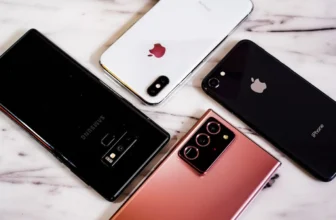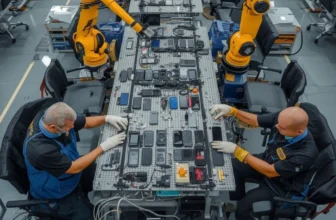
In recent years, smartphones have become an integral part of our daily lives. With advancements in technology, these devices are not just limited to making calls and sending messages; they’ve evolved into powerful tools that can handle everything from social media to business operations. With the increasing capabilities of smartphones, many have wondered: will smartphones ever replace laptops?
While smartphones have come a long way in terms of performance and functionality, there are still key differences that make laptops a more suitable option for certain tasks. In this article, we’ll explore both sides of the debate and consider whether smartphones will eventually take over the role of laptops in the modern world.
The Rise of Smartphones: The Power in Your Pocket
Advancements in Hardware and Software
Over the past decade, smartphones have undergone remarkable upgrades in terms of hardware and software. Flagship models from brands like Apple, Samsung, and Google feature processors that are more powerful than many entry-level laptops. These phones now boast high-resolution displays, excellent camera systems, robust battery life, and powerful chips capable of handling demanding apps and multitasking.
Smartphone Use Cases That Mirror Laptops
Smartphones can now handle many tasks that were once limited to laptops. With a variety of apps for word processing, spreadsheets, email management, photo editing, and even video conferencing, smartphones have become viable alternatives to laptops for certain tasks. Cloud-based services like Google Drive and Dropbox allow users to access, edit, and store documents without the need for a laptop or desktop computer. Additionally, with mobile versions of programs like Microsoft Office, Adobe Photoshop, and Slack, it’s easier than ever to complete professional tasks on a smartphone.
Laptops: Still the Best Option for Many Tasks
Larger Screens and Full-Size Keyboards
While smartphones have made significant strides, they still cannot replicate the comfort and usability of a laptop’s larger screen and full-size keyboard. For tasks like extensive typing, coding, graphic design, or working with large spreadsheets, a laptop’s physical keyboard and larger display are essential for productivity and efficiency. The small screen size and reliance on touch-based input make smartphones less practical for people who need to work with multiple windows or perform complex tasks.
Multitasking and Performance Limitations
Laptops are still superior in terms of multitasking and overall performance. While modern smartphones can handle multiple apps running in the background, laptops provide a much more robust environment for running multiple programs simultaneously. Laptops also have more powerful CPUs and RAM, making them better suited for resource-intensive applications, such as video editing, 3D modeling, and gaming.
Storage and Expansion
Laptops typically come with larger storage capacities than smartphones, which makes them ideal for users who need to store large files, databases, or media. Additionally, laptops offer the option of external storage drives, USB ports, and expandable memory, giving users more flexibility in terms of storage and peripheral connections. Smartphones, on the other hand, are more limited in this regard, often relying on cloud storage or external adapters for additional storage, which can be cumbersome.
The Role of 5G and Foldable Technology
The Impact of 5G on Smartphones
The rollout of 5G technology has the potential to significantly enhance the capabilities of smartphones. With faster internet speeds, lower latency, and improved reliability, smartphones could become more powerful tools for remote work and online collaboration. This could make it easier to perform tasks that require constant internet access, such as video conferencing, cloud computing, and real-time collaboration.
5G-enabled smartphones could allow for more seamless video editing, gaming, and other bandwidth-intensive tasks that are traditionally associated with laptops. However, it’s important to note that even with 5G, smartphones will still have physical limitations in terms of screen size, storage, and processing power.
Foldable Smartphones: The Future of Mobile Productivity
Foldable smartphones are the latest innovation in the mobile industry, with devices like the Samsung Galaxy Z Fold and Huawei Mate X offering larger screens that can fold into a more portable size. These devices could be a game-changer for mobile productivity, offering a more laptop-like experience in a compact form. A foldable smartphone could allow users to enjoy a larger screen for multitasking and viewing documents while maintaining the portability of a smartphone. However, these devices are still in their early stages, and it remains to be seen whether they will be widely adopted and perfected.
Read More: Best Budgeting Apps for Your Phone
Hybrid Solutions: Smartphones and Laptops Working Together
The Rise of “Phone-Laptop Hybrids”
Rather than replacing laptops, smartphones may become even more integrated with laptops to create hybrid solutions. Some laptops already offer mobile phone connectivity, allowing users to sync their devices seamlessly and switch between them with ease. Products like the Samsung DeX allow users to connect their smartphone to a monitor, keyboard, and mouse to create a desktop-like experience, essentially transforming their phone into a laptop-like device. This creates an ecosystem where the strengths of both devices complement each other, allowing users to enjoy the best of both worlds.
Cloud Computing and Remote Work Solutions
Cloud computing is a growing trend that bridges the gap between smartphones and laptops. By storing data and running applications on remote servers, cloud services can be accessed from any device, including smartphones and laptops. This allows users to switch seamlessly between devices without losing access to their important files, documents, and applications. For remote workers, this hybrid model could make it easier to use both smartphones and laptops, depending on the task at hand.
Checkout: Top 5 Apps to Boost Mobile Performance
Conclusion: Will Smartphones Ever Replace Laptops?
While smartphones have become incredibly powerful and capable of handling many tasks traditionally reserved for laptops, it’s unlikely that smartphones will fully replace laptops in the near future. Laptops still provide advantages in terms of screen size, performance, storage capacity, and multitasking ability—features that are essential for many professionals and heavy users.
However, the future of mobile technology is exciting, with innovations like 5G, foldable screens, and hybrid systems bridging the gap between smartphones and laptops. Instead of one replacing the other, it’s more likely that smartphones and laptops will coexist, each serving specific needs depending on the task at hand. Smartphones will continue to improve and become more capable, but laptops will remain the go-to choice for tasks that require more power, larger screens, and greater flexibility.
In the end, smartphones and laptops will complement each other, and the ideal device for you will depend on your personal needs and preferences. Whether you’re working from home, traveling, or simply looking for entertainment, both devices offer unique benefits that can help you stay productive, connected, and efficient.
Frequently Ask Questions (FAQ’s)
While smartphones are powerful, laptops still offer better performance, multitasking, and storage for many professional tasks.
Laptops provide larger screens, full-size keyboards, and greater processing power, making them ideal for work and intensive tasks.
Foldable smartphones offer larger screens, but they still fall short of providing the same performance and features as laptops.
5G will improve connectivity and speed, but smartphones still face limitations in processing power and multitasking compared to laptops.
Yes, hybrid solutions like Samsung DeX and cloud computing allow smartphones and laptops to complement each other for enhanced productivity.





